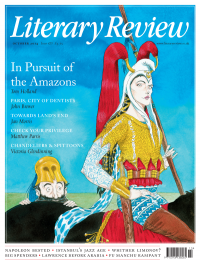Malise Ruthven
There Be Vipers
Mecca: The Sacred City
By Ziauddin Sardar
Bloomsbury 408pp £25
In the Alte Pinakothek in Munich hangs a quartet of paintings by Jan van Kessel the Elder (1626–79) showing the four continents then known to the West. Asia is represented by an elegant female figure with welcoming, outstretched arms suggestive of the riches awaiting Europe. Her turbaned companion stands guard beside her in an exotic baroque landscape replete with putti, birds and butterflies, all of them depicted in exquisite naturalistic detail. A side panel – entitled ‘Mecca’ – shows a much less seductive landscape cluttered with snakes, scorpions and monsters. Before reading Ziauddin Sardar’s entertaining and richly informative book, I had assumed that van Kessel was giving visual expression to typical Christian prejudices against the ‘abominations’ of Islam. Sardar’s text, however, would suggest that the Flemish master might have been elaborating on anecdotal knowledge filtering into Antwerp from the odd Muslim pilgrim who fetched up there or perhaps from one of those mariners captured by corsairs who found himself performing the Hajj alongside his master.
Early in his career Sardar, a prolific Muslim writer who has published widely on the natural and social sciences, as well as on Islam and cultural theory, spent five years in Mecca working on behalf of the Hajj Research Centre, based in Jeddah. This institution, established by the Saudi architect

Sign Up to our newsletter
Receive free articles, highlights from the archive, news, details of prizes, and much more.@Lit_Review
Follow Literary Review on Twitter
Twitter Feed
Under its longest-serving editor, Graydon Carter, Vanity Fair was that rare thing – a New York society magazine that published serious journalism.
@PeterPeteryork looks at what Carter got right.
Peter York - Deluxe Editions
Peter York: Deluxe Editions - When the Going Was Good: An Editor’s Adventures During the Last Golden Age of Magazines by Graydon Carter
literaryreview.co.uk
Henry James returned to America in 1904 with three objectives: to see his brother William, to deliver a series of lectures on Balzac, and to gather material for a pair of books about modern America.
Peter Rose follows James out west.
Peter Rose - The Restless Analyst
Peter Rose: The Restless Analyst - Henry James Comes Home: Rediscovering America in the Gilded Age by Peter Brooks...
literaryreview.co.uk
Vladimir Putin served his apprenticeship in the KGB toward the end of the Cold War, a period during which Western societies were infiltrated by so-called 'illegals'.
Piers Brendon examines how the culture of Soviet spycraft shaped his thinking.
Piers Brendon - Tinker, Tailor, Sleeper, Troll
Piers Brendon: Tinker, Tailor, Sleeper, Troll - The Illegals: Russia’s Most Audacious Spies and the Plot to Infiltrate the West by Shaun Walker
literaryreview.co.uk